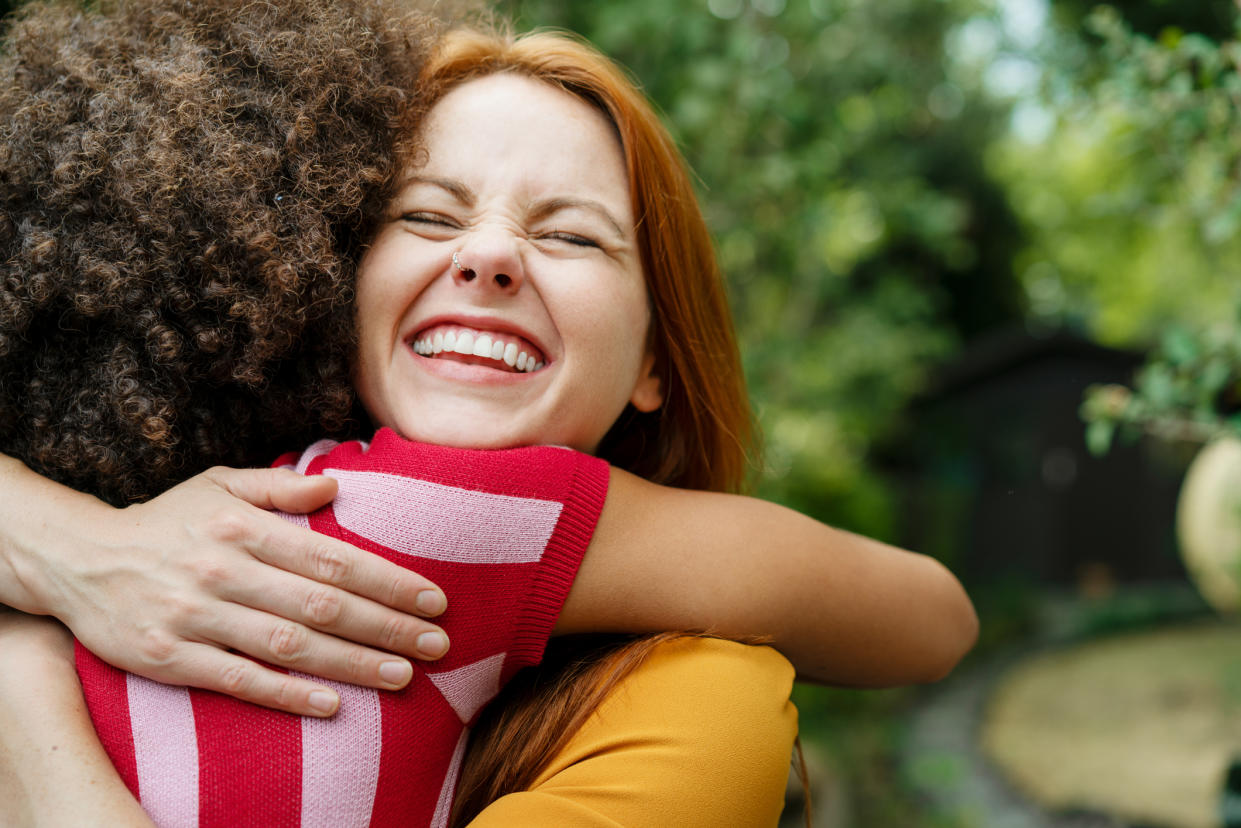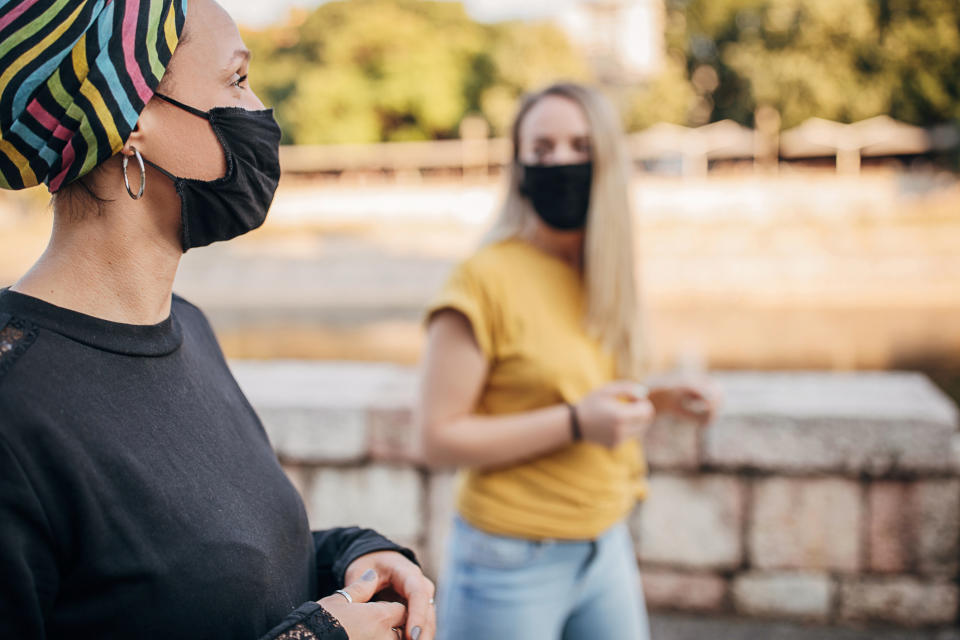Missing the 'cuddle hormone': How lockdown has impacted friendships

This year has been tough for us all in a myriad of ways, not least in terms of our relationships with our friends.
The sudden switch to WFH has made water cooler moments with workmates nigh on impossible, and the restrictions on how and where we can socialise due to lockdown have forced many of our friendships to be conducted online-only.
This Friday, October 9, marks 200 days since the beginning of lockdown and while being able to conduct our interactions digitally has helped us to maintain our friendships, the social strain of this new way of connecting seems to have caused many of us to suffer a form of friendship fatigue.
Read more: We miss colleagues more than we think during coronavirus lockdown
A fifth of the 70,000+ respondents in UCL’s COVID-19 social study, reported that their friendships outside of their household worsened over lockdown.
A further study of 2,000 adults, conducted by Santander, found that more than a fifth of people believe the pandemic has put a strain on existing friendships.
It seems many of us have found that that keeping in touch online is no real substitute for interacting in real life.

The power of a hug
Often when we think about physical contact, we think about our partners or family, but let’s not overlook the hugs and kisses we share with our pals too.
The unconscious hand squeeze, the casual arm thrown around a shoulder walking home after a night out... we’ve been deprived of those intimate gestures shared with a friend since March, and it has taken its toll on our relationships.
“We’re social beings designed to connect, so it’s easy to underestimate the power of human touch,” explains Dr Elena Touroni, a consultant psychologist and co-founder/co-CEO of My Online Therapy.
“When we hug, for example, we release oxytocin ‘the cuddle hormone’.
“Oxytocin is the feel-good hormone and it counteracts stress hormones like cortisol. By limiting our social interaction and physical contact with our friends, many of us are likely to have felt the effects on our mood.”
Read more: Money can’t buy love or friendship, researchers prove

Dr Caroline Harvey, senior lecturer in psychology at the University of Derby says this lack of touch will also have had an impact in terms of bonding with our mates.
“Physical contact is very important for people as it helps us to feel happier, more trusting and connected with other people,” she explains.
“Our skin is the largest organ and touch is the first sense to develop in the womb so it is really important to us. Because we aren’t able to hug or kiss our friends we need to use other ways to stay connected with them, which is where taking the time to get in contact for a chat can be really important.”
The trouble is if you’re not able or willing to put in the online hours to maintain a friendship there’s a very real chance that relationship could fade.
In fact according to a paper published in the Royal Society journal, without the right levels of investment, experts believe friendships can deteriorate in as little as three months.
The study, authored by the University of Oxford’s evolutionary psychologist, Professor Robin Dunbar, looked at how social connections worldwide have been impacted by lockdown.
And it turns out the odd WhatsApp or FaceTime isn’t always enough to keep all friendships on track.
“We have to see people surprisingly often to maintain a friendship,” Professor Dunbar explained to the BBC.
“And, because nurturing friendships requires all that time and cognitive capacity, we can only keep up a limited number of social connections.”
Read more: Being a hugger might be hereditary
Another impact lockdown has had on our friendships is something that experts have described as “relationship funnelling”, which is discussed in a large-scale survey, conducted in France during their own, highly restrictive, lockdown.
In basic terms, the research found that lockdown had a “funnelling effect” on relationships, including friendships.
While some friendships were prioritised while conducted online, other, more distant or marginal connections, just “fizzled out”.
Watch: Dating at a distance - crushes and celebrity loolalikes
To a certain extent, whether our friendship fizzled or flourished may depend on how well we were able to adapt to the new way of socialising.
“Some people will have found it harder, as a lot of us rely on those social interactions that take place meeting up with friends and engaging in joint activities from going to the gym or a class with a friend, to going out for meals or to the pub with a large group of friends,” explains Dr Harvey.
“This can lead to people feeling disconnected from their friends if they are unable to socialise in the ways would in normal circumstances.”
However, humans are also very adaptable, so for those who were able to adapt, switching hanging in the flesh to hanging via google, their friendships may have remained largely unaffected.
But others, who may not be as able or willing to use technology so easily, could have found things more difficult.
“Technology can facilitate the maintenance of friendships for some, but make it more difficult for others. People who might find using technology to stay in contact difficult may have made greater use of telephone calls with others and we are seeing a lot of this with the older generation,” she adds.

It’s not all doom and gloom for our friendships, however, as experts also believe the pandemic may have had a positive impact on certain relationships mainly because adversity can often bring us closer together.
“This year has been a challenge for everyone, and it is an experience we have all shared,” explains Dr Touroni.
“Within certain friendships these shared challenges may have allowed us to deepen our bond.
“It may have brought better communication and deepened the quality of our conversations. We may have also found ourselves reconnecting with old friends, and re-establishing meaningful connections with those we had otherwise lost touch with over the years.”
Read more: How to make friends as an adult
And, as Professor Dunbar also points out in his paper, many people also formed new friendships with people on their street and in their community for the very first time.
“Some people have made new friends during the pandemic, for example neighbours have helped out neighbours living alone, and got to know them in a way they might not have done prior to COVID-19,” Dr Harvey adds.
But if you have found lockdown has caused you to drift apart from your mates, there are certain measures you can take to get your friendships back on track.
How to maintain friendships in the era of COVID-19
Up your non-verbal communication
Facial expressions are an important mode of communication, and of course, we lose some of that wearing a face mask, which in turn can impact our friendships. To help us communicate better with our friends Dr Touroni suggests putting more focus on really listening to the other person and tuning in to their body language.
“For close friends, it might have felt weird or caused a bit of a barrier initially, but this is likely to be short-lived. When we really want to connect with someone, we’ll always find a way,” she adds.
Reach out
Just because you’ve drifted doesn’t mean the friendship is done. “Don’t be afraid to make the first move by sending a message or making a call to your friend. A text, WhatsApp, or telephone call can all help to open up the friendship again,” says Dr Harvey.
Two-way talking
While it is good to offload, it is equally good to listen. “Take time to find out how your friend is doing, make sure you don’t just talk at them but take turns in the conversation and make time to listen,” Dr Harvey says “Listening and really paying attention helps our friends to feel valued.”
Say thank you!
According to Dr Harvey friendships can benefit from some of the techniques used in positive psychology. “One thing that I did early in the lockdown was to send little messages of thanks our to some of my friends and close contacts,” she explains.
“Simple things like saying ‘thank you for all the times you’ve cheered me up and made me laugh’ can really make someone’s day. What is nice about this activity is you feel great about the message you have just sent, and the person receiving it also feels good. This can lead to them then sending you a similar message and so the good vibes really do go around!”
Open up
The pandemic has been difficult for many of us, but Dr Harvey suggests letting your friend know you have been finding things hard. “That can provide an opener to getting in touch again,” she says. “Let them know how things have affected you and then ask about how they are managing.”



